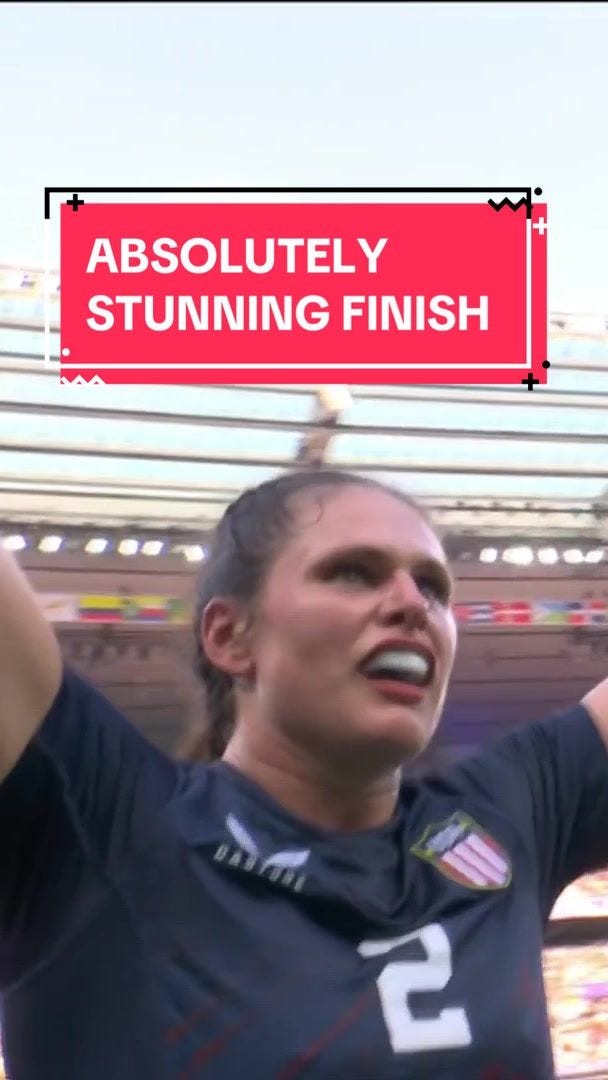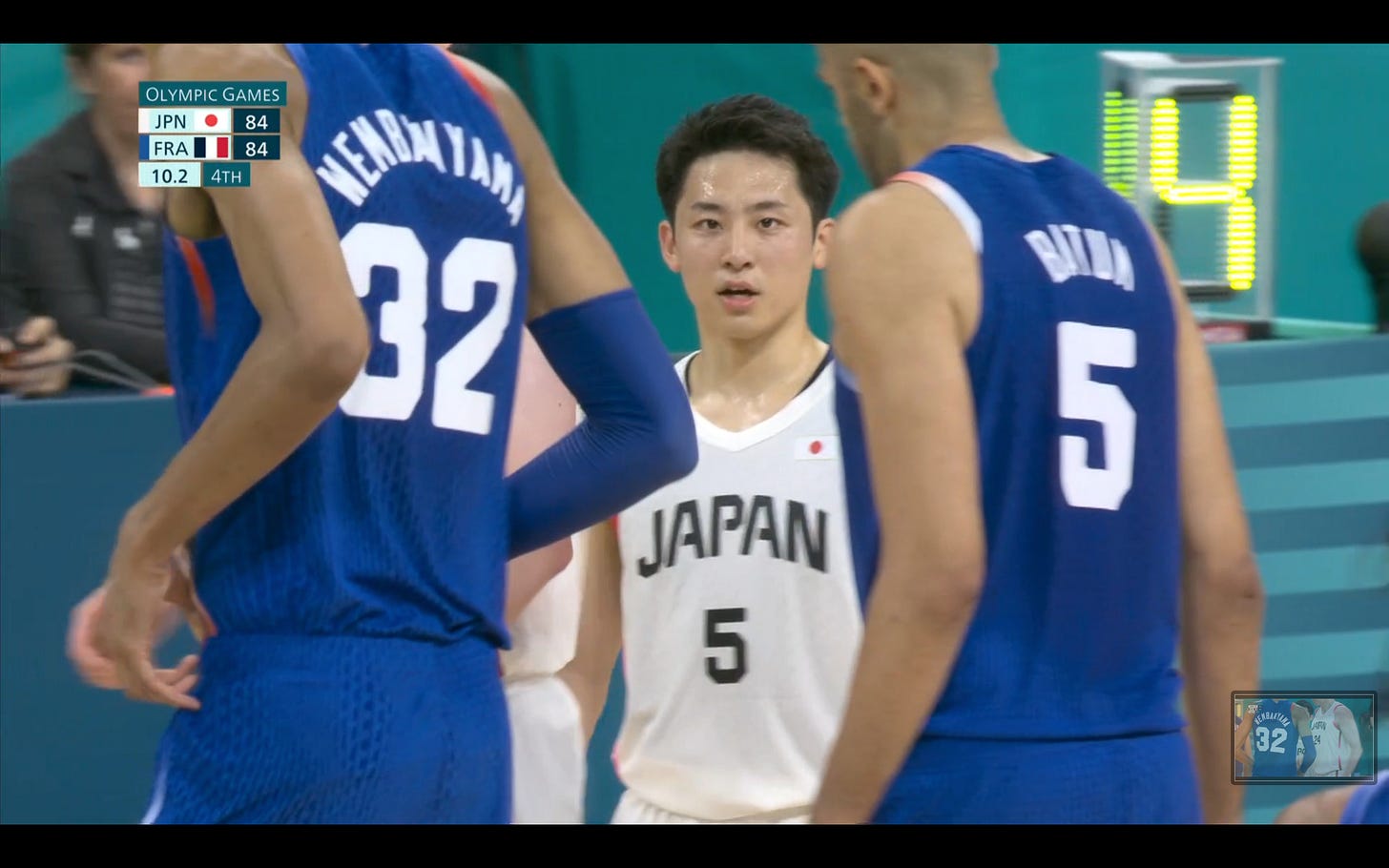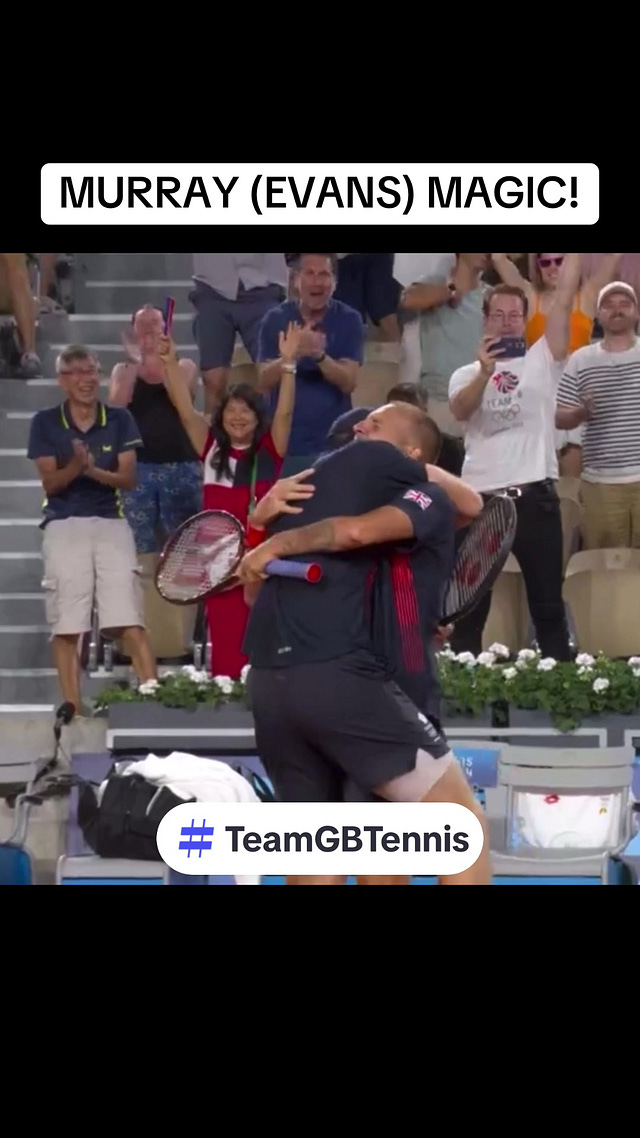Rings Roundup, Day 4: AMERICA'S GONNA WIN THE RUGBY GAME!
Team USA stole bronze from Australia in Team USA most iconic moment of the Olympics so far. Plus, gymnastics glory and a David vs. Goliath basketball battle.
The biggest story of Tuesday at the Olympics was easy: Simone Biles and Team USA coasted to gold in the women’s team gymnastics event. In some ways, this was totally not newsworthy: Team USA has won seven consecutive world championships, and was the heavy favorite to win gold again. But it marked a return to form after Biles dropped out of the 2024 team final mid-event due to a sudden bout of “the twisties,” leading to silver. Before I start awarding rings, I’d like to talk about just how massive this W was.
Team USA went to Paris without two critical components of their 2022 and 2023 world championship teams—Skye Blakely and Shilese Jones, who suffered an Achilles tear and an ACL tear at team trials. And they screwed up their beam situation: After bringing 16-year old Hezly Rivera, the top beam scorer at trials, specifically to provide a Nedoroscik-esque boost on the apparatus, Rivera scored poorly in qualification and the coaches opted to leave her on the sideline and send Jordan Chiles on beam. But Chiles fell on beam, resulting in one of the lowest scores by any competitor in the event.
And despite coping with injuries, poor roster selection, and a fall… they won by by 5.8 points, almost as big as the gap between second place and last place (6.03 points). Team USA’s gymnastics are so elite that even their less-than-perfect is untouchable. They’ve won their first gold of Paris, but there are plenty more to come.
99 Rings: Team USA’s Rugby Miracle
They’re Rugby Touchdowns now. Sorry. You can’t watch the end of Team USA’s win in the bronze medal rugby sevens game and tell me they aren’t Rugby Touchdowns. Stop trying to make “try” happen!
Team USA seemingly got a bad break in the bracket. Their semi final matchup was with New Zealand, one of two teams to ever win the Women’s Seven Series or the Rugby World Cup Sevens. They lost, because New Zealand is the best team in the world, as we wrote about in our preview.
In the bronze medal match, they faced…. the other team ever to win the Women’s Sevens Series and the Rugby World Cup Sevens, Australia. In fact, they were the reigning champions of both. The writing was on the wall.
Team USA fought hard, but seemed to have lost when they gave up a go-ahead score with a minute to go. Leading with under 30 seconds to go, Australia opted for a deep kick to seal the game. Most rugby kickoffs are “onside kick” style pop-ups that allow both teams to compete for possession, but sometimes, when leading late in games, they boot it deep, sacrificing the ability to compete for the ball in exchange for field position.
As someone who has watched rugby sevens for at least a week at this point, and therefore has the right to question every single strategy in the entire sport this always seemed strange to me: Aren’t there, like, constantly extremely long tries in rugby sevens? Since there are seven players on a field designed for 15 people, people are going 50-90 yards for scores all the time. Sometimes all it takes is a single missed tackle or quality offload springs a player for a massive score.
WELL GUESS WHAT HAPPENED.
(It’s unclear why NBC has chosen to post the matter-of-fact conversion instead of the thrilling score, but I guess you’ll just have to imagine the things I’m describing in the next paragraph.)
With under 10 seconds remaining, Alex “Spiff” Sedrick broke through an Australian leg tackle, but immediately found herself facing two more Aussies. She bullied over Australia’s Teagan Levi, powering forward like a bulldozer until Levi was on the ground. It wasn’t a stiff-arm or a truck stick: It was just power, power, power, like one of those videos of a hydraulic press squeezing something solid until oozes. Australia’s Tia Hinds was also in position to make a tackle, but all of a sudden Sedrick wasn’t there to be tackled anymore. Sedrick looks up with shock and disbelief. She’d just watched an American mush her championship-winning teammate to goo and run away with an Olympic medal.
The win wasn’t immediate—Sedrick he had about 95 yards to go after that, but she had enough speed on top of all that power to get well clear of any Aussie defenders and coast to the end zone. It’s the moment of the Olympics so far, for me: the moment sheer willpower turned a sure loss into a historic win.
5.8 Rings: David vs Goliath
My favorite part of Olympic men’s basketball is watching NBA stars work together to achieve something greater than they usually could. My second favorite part is watching non-NBA stars show they can compete against the world’s best. And Tuesday brought us a Japanese Fairleigh Dickinson vs. Purdue situation.
France entered its home Olympic men’s basketball tournament with semi-legitimate hopes of taking down Team USA led by one of the largest Twin Tower arrangements in basketball history: They have Victor Wembanyama, the 7’4 mega-prospect whose body was designed for basketball by the basketball gods, and 3-time NBA defensive player of the year Rudy Gobert, who checks in at a relatively short 7’1.
On Tuesday, they had a surefire walkover matchup against Japan, which features one of the shortest competitive basketball rosters imaginable. Their star point guard Yuki Kawamura, is 5-foot-8; their captain, one-time G-Leaguer Yuki Togashi, is 5-foot-6. Les souris sont dans la maison! Japan’s roster has one active NBA player, Rui Hachimura… and Hachimura got ejected during the game on intentional foul calls that we can describe as “dubious.” That left Kawamura to carry the load against a team of giants.
Kawamura knew the way David beat Goliath was with the slingshot, so he loaded that sucker up with rocks and started firing. He drilled five threes and posted a game-high 29 points, with five threes, often launching over France’s 7-footers.
Japan led by as much as eight in the fourth quarter, but France was able to force overtime after a miracle four-point play featuring a foul call that we can describe as “dubious.” Wembanyama scored eight straight points in OT, and France won.
Yuki could earn his chance to play against Wemby and Rudy again—he was recently signed to an Exhibit 10 contract with the Grizzlies, which means he’ll get a tryout in the fall and will likely end up in the G-League. But Japan is still looking for their first men’s basketball win at the Olympics since 1972.
2 rings: La femme sans la gène d’embrayage
I have to imagine that if you told any Olympic athlete that they’d finish the games with medals in every one of their events, they’d take the deal no questions asked. But France’s Auriane Mallo-Breton clearly got the Twilight Zone/cursed monkey’s paw version of the deal.
Mallo-Breton lunged and poked her way to the gold medal match of the women’s épée competition on Saturday. Mallo-Breton took a 7-1 lead, on Hong Kong’s Vivian Kong, but Kong roared back and won in overtime. Mallo-Breton was, understandably, devastated after having gold on her sword and letting it slip away.
Tuesday was the women’s épée team event, and Team France once again lunged and poked their way to the gold medal match—and as the match once again headed towards overtime, France put their best fencer in, their Olympic medalist, Auriane Mallo-Breton. France had the lead with 13 seconds left, but Mallo-Breton couldn’t run out the clock and Italy forced overtime. (Why does every fencing match go to overtime? Is there some way I can bet on underdog fencers and the points?) And Italy scored the winning point in sudden death, once again leaving Mallo-Breton devastated:
Look, two silver medals, c’est incroyable, c’est magnifique! Only a few thousand humans on a planet with billions of people have ever won even one medal, and you have two! There’s no reason to spend the rest of your life obsessing about the split-seconds when you let yourself, your teammates, and the entire nation of France down during your two once-in-a-lifetime opportunities to win Olympic gold at home! I’m sure it’ll be fine!
4 Rings: Andy Murray
I wrote a big entry two days ago about Andy Murray raging against the dying of the light by saving five consecutive match points in the Olympics doubles tournament to avoid retirement. I only put so much effort and thought into the writing because I assumed Murray wouldn’t do it again.
After all, Murray’s body is falling apart; his doubles partner is Dan Evans, who qualified for Paris as a singles player and does not have significant success playing doubles, and their second-round opponent, the Belgian pair of Sander Gillé and Johan Vleuten, are clay court doubles experts who won this year’s Monte Carlo tournament on clay and reached the finals of the 2023 French Open championship match.
But guess what: The big lad from Glasgow did it again! Evans and Murray saved another two match points in another second-round tiebreaker to avoid defeat again, jumping up and down like little kids after pulling yet another rabbit out of another hat.
They’re now in the quarterfinals, and I won’t be waxing poetic about this win because quite frankly at this point I expect Evans and Murray to win the whole damn thing.
3 Rings: Another bronze gymnastics hero
With Team USA’s gold medal win more or less guaranteed, the drama came down the podium. Brazil’s chances of medal contention seemed in doubt when Flávia Saraiva had a big fall on the uneven bars, leading to a cut on her forehead and obvious bruising on her eye.
Flávia’s injuries weren’t too severe—she didn’t have a concussion or anything. But she had to go out and compete in the actual event on the same apparatus where she’d bashed her head into the ground, as Brazil didn’t really have a suitable backup on bars.
Flávia went out there with a band-aid and visible bruising and scored a 13.433—a .3 point improvement on her uneven bar score in qualifying. Brazil beat Great Britain for the bronze by .234 points, earning their first medal ever in the team event.
Why are all the contests for gymnastics bronze so damn dramatic?
Zero Rings: The Pool
There haven’t been any world records at the Olympics so far. were five swimming world records set in Tokyo, eight in Rio, and nine in London. (At the Beijing Olympics, there were 25 world records set in 34 events, but that was pretty clearly an outlier due to the Speedo LZR suit introduced at those games.) You’re not supposed to be able to get halfway through the swimming events with no new records.
My first thought was possible we’ve simply reached the pinnacle of swimming achievement… but there have been five world records set this year, and those same swimmers are slower now. Ariarne Titmus set the 200m freestyle world in June, but was 1.6 seconds slower in Paris. Summer McIntosh set the 400 IM record in May, and was 3.4 seconds slower in Paris. Either every swimmer is disappointing, or the pool is slow. The Washington Post hypothesizes it’s because the pool isn’t deep enough, allowing the aquatic reverberations from each stroke to ricochet to the surface faster and create choppier water.
Of course, the pool is slower for everyone—but I personally believe this is the reason Australia is kicking Team USA’s ass in the pool. They eked out another gold over Team USA yesterday, with Kaylee McKeown beating Regan Smith to the wall in the 100m backstroke. Ah well, they gave us rugby, we can give them swimming.














Sorry to be pedantic: The Japanese men's basketball team's captain's last name is Togashi, not to be confused with togarashi which is a type of delicious seasoning!
99 rings - Rodger Sherman recaps